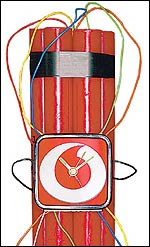Iraq OK's Federalism: Doesn't Apply For 18 Months genre: Just Jihad & Polispeak & Six Degrees of Speculation

The Iraqi parliament approved a bill that authorizes the formation of regions within the country that will have a substantial level of autonomy however the provision will not be enacted for 18 months. The delay was a concession by the Shiite dominated parliament to the objections of the Sunni minority. The Washington Post has the details in a new article.
The idea of autonomous regions is one that has been previously proposed by Senator Joe Biden as a means to resolve the longstanding sectarian divisions. Unfortunately, the new bill appears to ignore a key element of the Biden proposal...that being a provision for each sectarian group to have a stake in the oil revenues anticipated to be generated by the oil rich country. The new bill angered the Sunni minority as they occupy regions of Iraq that lack significant oil production. This legislation reinforced the fears of Senator Biden that any partitioning which failed to address Sunni concerns may well expand the sectarian violence.
BAGHDAD, Iraq -- The Shiite-dominated parliament Wednesday passed a law allowing the formation of federal regions in Iraq, despite opposition from Sunni lawmakers and some Shiites who say it will dismember the country and fuel sectarian violence.
The federalism law sets up a system for allowing provinces to join together into autonomous regions that would hold considerable self-rule powers, a right given to them under the constitution adopted last year in a national referendum.
Some Shiites want to create an autonomous zone in their heartland in the south, much like the self-ruling Kurdish region in northern Iraq.
But Sunni Arabs deeply oppose the federalism measures, fearing it will divide Iraq into sectarian mini-states, giving Shiite and Kurds control over oil riches in the south and north, and leaving Sunnis in an impoverished central zone without resources.
My own evaluation of this news is quite grim for several reasons. First, it demonstrates the level of division within the Iraqi government and the Iraqi population...a bad indication that any hoped for resolution of the sectarian violence is apt to materialize in the near future. Second, it confirms an argument previously made here at Thought Theater that the participation in the U.S. imposed elections was likely nothing more than an effort by each sectarian group to amass enough power to determine how the fledgling country would be governed...a far cry from the embrace of democracy touted by the Bush administration. Third, the 18 month timeframe suggests that tensions will escalate in anticipation of the new provision as the various groups attempt to position themselves to influence and determine the boundaries of any autonomous regions.
Critics also have warned that moves for federalism could fuel Shiite-Sunni violence.
"This is the beginning of the plan to divide Iraq," said Adnan al-Dulaimi, leader of the Sunni National Accordance Front, which boycotted the vote along with al-Sadr's party and the Shiite Fadila party.
The law outlines a process for forming regions, requiring any province considering joining a region to hold a referendum, if a third of the provincial legislators request it.
Note that the parameters for establishing regional affiliations requires only a third of the provincial legislators to request a vote. I view that number to be a calculation intended to assure that sectarian groups can define the regions they prefer by being able to achieve the necessary one third threshold. Anyone that views this as democracy at work is sadly misguided or deeply entrenched in denial. The impetus for a united Iraq based upon a populist mentality doesn't exist. On the contrary, the various sectarian groups are simply manipulating the democratic process for advantage...and that advantage includes the need to control oil revenues. What we are witnessing is more closely akin to the continuation of a primitive tribal approach to power than to a groundswell for the implementation of an equitable democracy.
In September, the Sunni parties agreed to allow the bill to be presented to parliament for a vote after reaching a deal with Shiite lawmakers that the law would not come into effect for 18 months and that a committee would be formed to consider constitutional changes sought by the Sunnis.
Still, the Sunnis tried to prevent the vote Wednesday, and Shiite parties accused them of breaking the agreement. During the voting, some lawmakers demanded that the provision putting off regions for 18 months be removed from the law to allow their formation immediately.
But in the end, the 18-month delay was grudgingly passed.
I hate to be pessimistic, but I see the next 18 months as a dogfight to determine the prevailing alpha-male. I just don't see the makings of any peaceful resolution...and any hopes to implement one would likely require the commitment of more U.S. troops for a lengthy and unpredictable period of time. I take little comfort in the reports that we have trained some 300,000 Iraqi troops; primarily because I fear that their sectarian allegiances will prevail as the various groups jockey for power. As I've said before, the United States may simply be training and arming the combatants in an inevitably escalating civil war. The goal of exporting democracy...the principle tenet of the Bush Doctrine...suffers one essential oversight...it requires that those on the receiving end have a fundamental desire to import democracy. I just don't believe that Iraq currently fits into that equation.
Post a comment